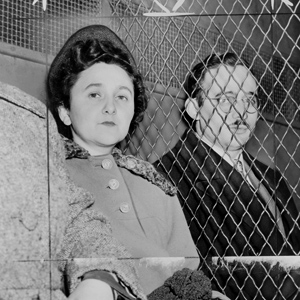Ethel Rosenberg wasn't a spy, and recently released testimony helps prove it, her sons say

Ethel and Julius Rosenberg are taken from the courthouse after their guilty verdict. Photo from the Libary of Congress.
Ethel Rosenberg wasn’t a spy, and President Barack Obama should acknowledge she was wrongly executed, according to her sons, Michael and Robert Meeropol.
The Meeropols support their assertion with recently released grand jury testimony by Ethel Rosenberg’s brother, David Greenglass, who was an Army machinist at the weapons installation in Los Alamos, New Mexico, where the atomic bomb was developed. The Meeropols make their argument in an op-ed published by the New York Times. Associated Press coverage of the testimony is here.
Greenglass and his wife, Ruth, testified at trial that Ethel participated in a September 1945 meeting when David gave a sketch of the atomic bomb to Ethel’s husband, Julius Rosenberg. Ethel typed David’s handwritten notes about the diagram during the meeting, the Greenglasses testified.
But in his grand jury testimony, David Greenglass said his sister had never spoken to him about participating in a spy ring. There was no mention of a meeting and no mention of typed notes. “I said before, and say it again, honestly, this is a fact: I never spoke to my sister about this at all,” David Greenglass testified. Ruth Greenglass also made no mention of such a meeting in her grand jury testimony, the Meeropols say.
Ethel and Julius Rosenberg were convicted of conspiracy to commit espionage and executed in 1953. The Meeropols say they have concluded that their father was guilty of the conspiracy charge, but neither of their parents deserved the death penalty.
David Greenglass, who served 10 years in jail, later told a New York Times reporter that he lied about his sister to protect his wife, Ruth, according to the op-ed. “We believe that David and Ruth invented the Sept. 25 meeting to shift blame to our parents for leaking the bomb sketch,” the Meeropol brothers write.
The brothers believe their mother was prosecuted “primarily for refusing to turn on our father.” They cite a federal prosecutor’s testimony before a congressional committee that the case against Ethel Rosenberg was weak, but she should be convicted as a deterrent. They also cite a statement by a former Justice Department lawyer that the government’s objective was to get the Rosenbergs to talk, rather than to execute them.
“Our mother was not a spy,” the Meeropols write. “The government held her life hostage to coerce our father to talk, and when that failed, it extracted false statements to secure her wrongful execution. The apparent rationale for such action—that national security demanded it during a time of international crisis—has disturbing implications in post-9/11 America”



